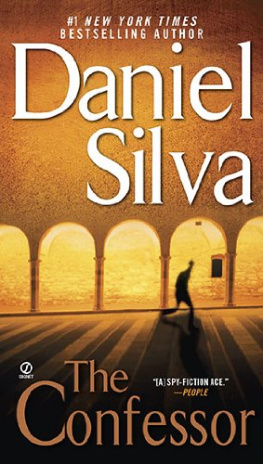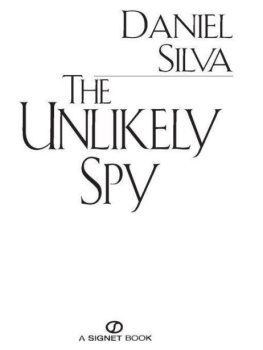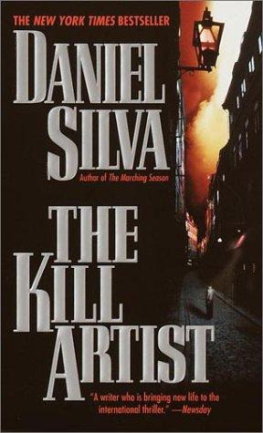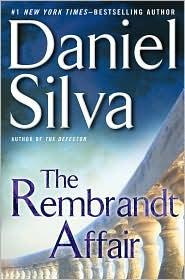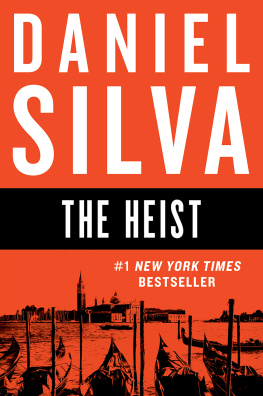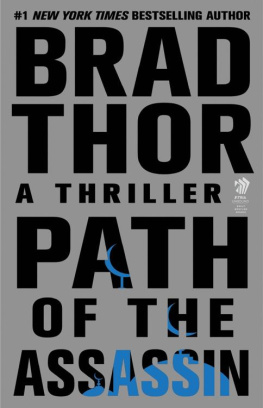Daniel Silva - The Confessor
Here you can read online Daniel Silva - The Confessor full text of the book (entire story) in english for free. Download pdf and epub, get meaning, cover and reviews about this ebook. year: 2004, publisher: Penguin Books Ltd, genre: Detective and thriller. Description of the work, (preface) as well as reviews are available. Best literature library LitArk.com created for fans of good reading and offers a wide selection of genres:
Romance novel
Science fiction
Adventure
Detective
Science
History
Home and family
Prose
Art
Politics
Computer
Non-fiction
Religion
Business
Children
Humor
Choose a favorite category and find really read worthwhile books. Enjoy immersion in the world of imagination, feel the emotions of the characters or learn something new for yourself, make an fascinating discovery.
- Book:The Confessor
- Author:
- Publisher:Penguin Books Ltd
- Genre:
- Year:2004
- Rating:3 / 5
- Favourites:Add to favourites
- Your mark:
- 60
- 1
- 2
- 3
- 4
- 5
The Confessor: summary, description and annotation
We offer to read an annotation, description, summary or preface (depends on what the author of the book "The Confessor" wrote himself). If you haven't found the necessary information about the book — write in the comments, we will try to find it.
The Confessor — read online for free the complete book (whole text) full work
Below is the text of the book, divided by pages. System saving the place of the last page read, allows you to conveniently read the book "The Confessor" online for free, without having to search again every time where you left off. Put a bookmark, and you can go to the page where you finished reading at any time.
Font size:
Interval:
Bookmark:
The Confessor
The Confessor
The Confessor
by Unknown
The Confessor
The Confessor
By Daniel Silva
FROM THE AUTHOR OF THE ENGLISH ASSASSIN
Art restorer Gabriel Allon is trying to put his secret service past behind him. But when his friend Benjamin Stern is murdered in Munich, he's called into action once more.
Police in Germany are certain that Stern, a professor well known for his work on the Holocaust, was killed by right-wing extremists. But Allon is far from convinced. Not least because all trace of the new book Stern was researching has now mysteriously disappeared...
Meanwhile, in Rome, the new Pope paces around his garden, thinking about the perilous plan he's about to set in motion. If successful, he will revolutionize the Church. If not. he could very well destroy it...
In the dramatic weeks to come, the journeys of these two men will intersect.
Long-buried secrets and unthinkable deeds will come to light and both their lives will be changed for ever...
'The Confessor opens with a startling twist, then gets even better. It will resonate with fans of Dan Brown's novels, as long-buried secrets about unthinkable deeds are unearthed. The pace is relentless...'
'A shrewd, timely thriller that opens the heart of the Vatican.'
Roma locuta est; causa finita est. Rome has spoken; the case is closed.
ST. AUGUSTINE OF HIPPO
THE APARTMENT HOUSE at Adalbertstrasse 68 was one of the few in the fashionable district of Schwabing yet to be overrun by Munich's noisy and growing professional elite. Wedged between two red brick buildings that exuded prewar charm, No. 68 seemed rather like an ugly younger stepsister. Her facade was a cracked beige stucco, her form squat and graceless. As a result her suitors were a tenuous community of students, artists, anarchists, and unrepentant punk rockers, all presided over by an authoritarian caretaker named Frau Ratzinger, who, it was rumored, had been living in the original apartment house at No. 68 when it was leveled by an Allied bomb. Neighborhood activists derided the building as an eyesore in need of gentrification. Defenders said it exemplified the very sort of Bohemian arrogance that had once made Schwabing the Montmartre of Germany--the Schwabing of Hesse and Mann and Lenin. And Adolf Hitler, the professor working in the second-floor window might have been tempted to add, but few in the old neighborhood liked to be reminded of the fact that the young Austrian outcast had once found inspiration in these quiet tree-lined streets too.
To his students and colleagues, he was Herr Doktorprofessor Stern. To friends in the neighborhood he was just Benjamin; to the occasional visitor from home, he was Binyamin. In an anonymous stone-and-glass office complex in the north of Tel Aviv, where a file of his youthful exploits still resided despite his pleas to have it burned, he would always be known as Beni, youngest of Ari Shamron's wayward sons. Officially, Benjamin Stern remained a member of the faculty at Hebrew University in Jerusalem, though for the past four years he had served as visiting professor of European studies at Munich's prestigious Ludwig-Maximilian University. It had become something of a permanent loan, which was fine with Professor Stern. In an odd twist of historical fate, life was more pleasant for a Jew these days in Germany than in Jerusalem or Tel Aviv.
The fact that his mother had survived the horrors of the Riga ghetto gave Professor Stern a certain dubious standing among the other tenants of No. 68. He was a curiosity. He was their conscience. They railed at him about the plight of the Palestinians. They gently asked him questions they dared not put to their parents and grandparents. He was their guidance counselor and trusted sage. They came to him for advice on their studies. They poured out their heart to him when they'd been dumped by a lover. They raided his fridge when they were hungry and pillaged his wallet when they were broke.
Most importantly, he served as tenant spokesman in all disputes involving the dreaded Frau Ratzinger. Professor Stern was the only one in the building who did not fear her. They seemed to have a special relationship. A kinship.
It's Stockholm Syndrome, claimed Alex, a psychology student who lived on the top floor. Prisoner and camp guard. Master and servant.
But it was more than that. The professor and the old woman seemed to speak the same language.
The previous year, when his book on the Wannsee Conference had become an international bestseller, Professor Stern had flirted with the idea of moving to a more stylish building--perhaps one with proper security and a view of the English Gardens. A place where the other tenants didn't treat his flat as if it were an annex to their own. This had incited panic among the others. One evening they came to him en masse and petitioned him to stay.
Promises were made. They would not steal his food, nor would they ask for loans when there was no hope of repayment. They would be more respectful of his need for quiet. They would come to him for advice only when it was absolutely necessary. The professor acquiesced, but within a month his flat was once again the de facto common room of Adalbertstrasse 68. Secretly, he was glad they were back. The rebellious children of No. 68 were the only family Benjamin Stern had left.
The clatter of a passing streetcar broke his concentration.
He looked up in time to see it disappear behind the canopy of a chestnut tree, then glanced at his watch. Eleven-thirty. He'd been at it since five that morning. He removed his glasses and spent a long moment rubbing his eyes. What was it Orwell had said about writing a book? A horrible, exhausting struggle, life a long bout of some painful illness. Sometimes, Benjamin Stern felt as though this book might be fatal.
The red light on his telephone answering machine was blinking. He made a habit of muting the ringers to avoid unwanted interruptions. Hesitantly, like a bomb handler deciding which wire to cut, he reached out and pressed the button. The little speaker emitted a blast of heavy metal music, followed by a warlike yelp.
I have some good news, Herr Doktorprofessor. By the end of the day, there will be one less filthy Jew on the planet! Wiedersehen, Herr Doktorprofessor.
Click.
Professor Stern erased the message. He was used to them by now. He received two a week these days; sometimes more, depending on whether he had made an appearance on television or taken part in some public debate. He knew them by voice; assigned each a trivial, unthreatening nickname to lessen their impact on his nerves. This fellow called at least twice each month.
Professor Stern had dubbed him Wolfie. Sometimes he told the police. Most of the time he didn't bother. There was nothing they could do anyway.
He locked his manuscript and notes in the floor safe tucked beneath his desk. Then he pulled on a pair of shoes and a woolen jacket and collected the rubbish bag from the kitchen. The old building had no elevator, which meant he had to walk down two flights of stairs to reach the ground floor. As he entered the lobby, a chemical stench greeted him. The building was home to a small but thriving cosmetic. The professor detested the beauty shop.
When it was busy, the rancid smell of nail-polish remover rose through the ventilation system and enveloped his flat. It also made the building less secure than he would have preferred. Because the cosmetic had no separate street entrance, the lobby was constantly cluttered with beautiful Schwabinians arriving for their pedicures, facials, and waxings.
He turned right, toward a doorway that gave onto the tiny courtyard, and hesitated in the threshold, checking to see if the cats were about. Last night he'd been awakened at midnight by a skirmish over some morsel of garbage. There were no cats this morning, only a pair of bored beauticians in spotless white tunics smoking cigarettes against the wall. He padded across the sooty bricks and tossed his bag into the bin.
Next pageFont size:
Interval:
Bookmark:
Similar books «The Confessor»
Look at similar books to The Confessor. We have selected literature similar in name and meaning in the hope of providing readers with more options to find new, interesting, not yet read works.
Discussion, reviews of the book The Confessor and just readers' own opinions. Leave your comments, write what you think about the work, its meaning or the main characters. Specify what exactly you liked and what you didn't like, and why you think so.

